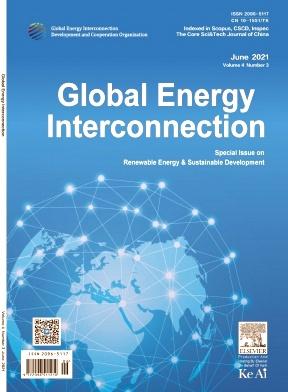Power forecasting method of ultra-short-term wind power cluster based on the convergence cross mapping algorithm
IF 1.9
Q4 ENERGY & FUELS
引用次数: 0
Abstract
The development of wind power clusters has scaled in terms of both scale and coverage, and the impact of weather fluctuations on cluster output changes has become increasingly complex. Accurately identifying the forward-looking information of key wind farms in a cluster under different weather conditions is an effective method to improve the accuracy of ultrashort-term cluster power forecasting. To this end, this paper proposes a refined modeling method for ultrashort-term wind power cluster forecasting based on a convergent cross-mapping algorithm. From the perspective of causality, key meteorological forecasting factors under different cluster power fluctuation processes were screened, and refined training modeling was performed for different fluctuation processes. First, a wind process description index system and classification model at the wind power cluster level are established to realize the classification of typical fluctuation processes. A meteorological-cluster power causal relationship evaluation model based on the convergent cross-mapping algorithm is proposed to screen meteorological forecasting factors under multiple types of typical fluctuation processes. Finally, a refined modeling method for a variety of different typical fluctuation processes is proposed, and the strong causal meteorological forecasting factors of each scenario are used as inputs to realize high-precision modeling and forecasting of ultra-short-term wind cluster power. An example analysis shows that the short-term wind power cluster power forecasting accuracy of the proposed method can reach 88.55 %, which is 1.57–7.32 % higher than that of traditional methods.
基于收敛交叉映射算法的超短期风电集群功率预测方法
风电集群的发展无论在规模上还是在覆盖范围上都已规模化,天气波动对集群产出变化的影响也日益复杂。准确识别集群内不同天气条件下重点风电场的前瞻信息是提高超短期集群功率预测准确性的有效方法。为此,本文提出了一种基于收敛交叉映射算法的超短期风电集群预测精细化建模方法。从因果关系的角度,筛选不同簇功率波动过程下的关键气象预报因子,并针对不同波动过程进行精细化训练建模。首先,建立风电集群级风过程描述指标体系和分类模型,实现对典型波动过程的分类;为了筛选多类型典型波动过程下的气象预报因子,提出了一种基于收敛交叉映射算法的气象-集群功率因果关系评价模型。最后,提出了一种针对多种不同典型波动过程的精细化建模方法,并将各情景的强因果气象预报因子作为输入,实现了超短期风电集群功率的高精度建模和预测。算例分析表明,该方法的短期风电集群功率预测准确率可达88.55%,比传统方法提高1.57 ~ 7.32%。
本文章由计算机程序翻译,如有差异,请以英文原文为准。
求助全文
约1分钟内获得全文
求助全文
来源期刊

Global Energy Interconnection
Engineering-Automotive Engineering
CiteScore
5.70
自引率
0.00%
发文量
985
审稿时长
15 weeks
 求助内容:
求助内容: 应助结果提醒方式:
应助结果提醒方式:


